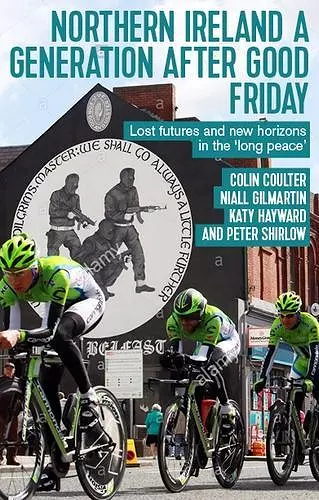Northern Ireland a Generation After Good Friday
Lost Futures and New Horizons in the ‘Long Peace’
Colin Coulter author Katy Hayward author Peter Shirlow author Niall Gilmartin author
Format:Hardback
Publisher:Manchester University Press
Published:6th Jul '21
Should be back in stock very soon

The Good Friday Agreement is widely celebrated as a political success story, one that has brought peace to a region that was once synonymous around the globe with political violence. The truth, as ever, is rather more complicated than that.
In many respects, the era of the peace process has seen Northern Irish society change almost beyond recognition. Those incidents of politically motivated violence that were once commonplace have become thankfully rare and a new generation has emerged whose identities and interests are rather more fluid and cosmopolitan than those of their predecessors. However, Northern Ireland continues to operate in the long shadow of its own turbulent past. Those who were victims of violence, as well as those who were its agents, have often been consigned to the margins of a society still struggling to cope with the traumas of the Troubles. Furthermore, the transition to ‘peace’ has revealed the existence of new, and not so new, forms of violence in Northern Irish society, directed towards women, ethnic minorities and the poor.
Northern Ireland a generation after Good Friday sets out to capture the complex, and often contradictory, realities that have emerged more than two decades on from the region’s vaunted peace deal. Across nine original essays, the authors offer a critical and comprehensive reading of a society that often appears to have left its violent past behind but at the same time remains subject to its gravitational pull.
'At a time when the currents of politics are more unpredictable than ever, it is tempting to look for the historical tide flowing in a certain direction, allowing complex questions to be reduced to a simple answer. The authors resist that intellectual temptation. They draw attention to enduring factors of social, economic and cultural turbulence beneath the modified institutional circumstances of what they call the "long peace." The book challenges some easy assumptions, questions some lazy ideas and provokes the reader into serious reflection about Northern Ireland’s present and future.'
Arthur Aughey, Emeritus Professor of Politics, Ulster University
'Timely and thoroughly researched, this book documents the remarkable changes in Northern Ireland society over the last two decades. Resisting overly celebratory assessments of the Good Friday Agreement, or fatalistic interpretations of its failures, the authors forensically explore the "long peace" which has succeeded the long 30 years of war in Northern Ireland. They identify potential sources and agents of progressive change and the formidable challenges to such change in the persisting forms of societal violence and structural inequality linked to class, gender, age and cultural division. This book should be indispensable reading for anyone who wants to understand the specificities of Northern Ireland within the intensifying debates over Irish unity, the break-up of the UK and the long-term ramifications of Brexit and the pandemic.'
Liam O’Dowd, Emeritus Professor of Sociology, Queen’s University Belfast
'The authors provide a thorough and realistic assessment of the situation and are neither unduly optimistic nor pessimistic. They employ the concept of a long peace, rooted in a realistic assessment of how meaningful change occurs, especially in the aftermath of decades of violence. They also do a very good job weaving together the long history of sectarianism and conflict in Northern Ireland, the traumas of the high levels of violence during the Troubles, and the current climate in various segments of Northern Irish society. Ultimately, the authors offer a realistic and somewhat sobering view that the 1998 agreement, which ended the high levels of violence, is better seen as the beginning of a long process toward peace in Northern Ireland, rather than as the achievement of peace.'
W. H. Mulligan Jr. (Emeritus), Murray State University, CHOICE (April 2022)
'While this book is no doubt of interest to academic audiences including historians, political scientists, sociologists and anthropologists, it is accessible to non-experts seeking to understand why the risk of violence persists.'
Amanda Hall, Irish Political Studies
'This book must be the new touchstone for anyone wishing to understand the realities of NI today outside of mere party politics. It deals critically with multiple aspects of Northern Irish society and synthesises these individually complex topics into a critique of the affects of liberal peace building strategies on NI. This is an invaluable contribution to the sociology of deeply divided societies.'
Peter Bothwell, Irish Journal of Sociology
ISBN: 9781526139269
Dimensions: 234mm x 156mm x 19mm
Weight: unknown
312 pages